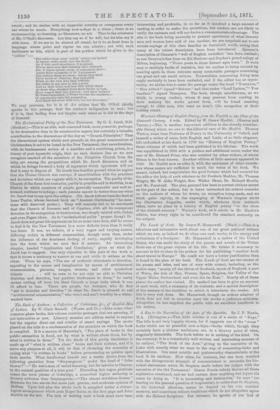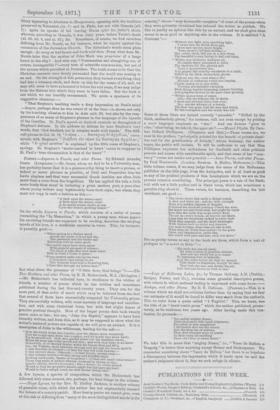A Key to the Narrative of the Acts of the
Apostles. By J. P. Norris, M.A. (Rivington.)—This little volUme is one of a series of " Keys." The title is not very happily chosen, for it suggests one of the "cram" books which are so plentiful now-a-days,—booke which, though they certainly have a sinister usefulness, are, in a literary point of view, singularly detestable. The book before us is nothing of the kind. On the contrary, it is a remarkably well-written and interesting account of its subject, "The Book of the Acts," giving us the narrative of St. Luke with exactly what we want in the way of connecting-links and illustrations. One most notable and praiseworthy characteristic of the book is its candour. How often, for instance, has one been wearied with the disingenuous attempti of couotnentators to reconcile the his- torical statements which St. Stephen made before his judges with the narrative of the Old Testament! Canon Norris calmly throws all those sophistries overboard, and we fool certain does anything but injure his cause by doing so. "It is interesting and instructive," he says " (aa bearing on the general question of inspiration), to notice that St. Stephen, in his historical allusions, seems to depend on his own unaided. memory, and sometimes follows traditions which do not altogether agree with tho Hebrew Scripture. For instance, he speaks of the God of
Glory appearing to Abraham in Mesopotamia, agreeing with the tradition preserved in Nehemiah (ix. 7) mid in Philo, but not with Genesis (xii. 1); again he speaks of his leaving Heron after his fitther's death, whereas, according to Genesis, it was sixty years before Teralfe death (xi. 26, xii. 4, and xi. 32), &o. Sometimes, of course, we find ourselves differing from Mr. Norris, as, for instance, when he argues against the communism of the Jerusalem Church. The historian's words seem plain enough. As many as had houses and knis sold them. From what does Mr. Norris infer that the mother of John Mark was proprietor of a large house in the city ? And why say, 'Communism and almsgiving are, of course, incompatible ?"-vory true of scientific eommun ism, but not of the system which prevailed at Jerusalem. The truth seems to be that the Christian converts were firmly persuaded that the world was coming to an end. On the strength of this persuasion they turned everything they had into a common stock, and drew on this for the wants of all, and, we may add, seem to have exhausted it before the mid came, if we may judge from the distress into which they seem to have fallen. But the hook is one which we can heartily r000mmend. We quote a specimen of its suggestive character :-
" That Stephen's teaching made a deep impression on Pani's mind -deeper, perhaps than he was 'mare of at the time-is shown not only by his touching allusion to him in Acts xxii. 20, but also by the reap- pearance of so many of Stephen's phrases in the language of the Apostle of the Gentiles. St. Paul's speech at Antioch reminds us throughout of Stephen's defence. In his address at Athens ho uses Stephen's very words, that 'God dwelleth not in temples made with hands.' The diffi- cult phrase in Gal. iii. 19, '6 v61,006 • • • bianzygig hi 47;X:ev,' corre- sponds with Stephen's 4 Arigers rim w6pmv erg biccrot7ots cl77iXcev ; while 4 iv xespi geolrou' is explained by the 80th verse of Stephen's, apology. St. Stephen's 'uncircumcised in heart' seems to reappear in St. Paul's 'true circumcision is that of the heart.'"































 Previous page
Previous page